Volens Et Potens
Posted on Sept. 26, 2023UNC hockey’s 39-year-old goaltender, Joel Hughes, found his band of brothers in Afghanistan — and then in Chapel Hill.
By Tim Crothers ’86
His goalie mask is a life collage. Airbrushed on the back are his Airborne Jumpmaster Wings, his Sniper sleeve tab and his Combat Infantryman Badge among others, and above them all is a simple message, Thanks Dad. Joel Hughes knows he would not be here on this night without that man.
Hughes’ blue-and-white UNC hockey club jersey features the number 27, a tribute to his first-ever unit, the 2nd battalion, 7th regiment. And underneath that his good luck charm, a black workout shirt from his Special Forces days. Before leaving the Tar Heels’ locker room, his final prep was to remove the silver bracelet he wears at all times, except during games, because it doesn’t fit under his catching glove. The bracelet is inscribed SFC Matthew Q. McClintock 1/5/2016 Marjah, Helmand, Afghanistan.
Wearing skates older than any of his teammates, Hughes stands in the goalie crease on the ice at Raleigh’s Carter-Finley Stadium in front of 57,000, including his biological father.
It’s the first time they’ve met.
Yet another improbable twist in a journey that began shrouded in uncertainty nearly 40 years ago. Turns out Hughes has been searching around the globe ever since trying to discover who he really is behind the mask.
Catcher to goalie
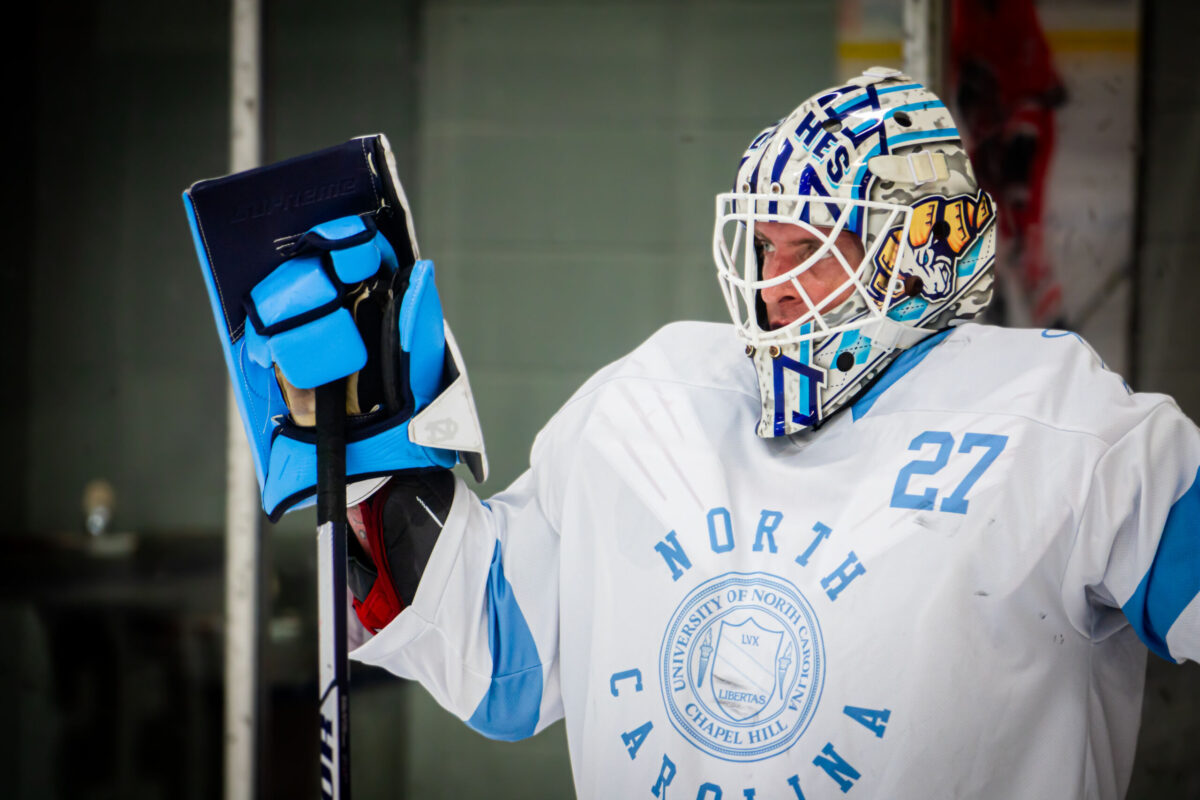
Hughes’ blue-and-white UNC hockey club jersey features the number 27, a tribute to his first-ever unit, the 2nd battalion, 7th regiment. (Photo: Carolina Alumni/Cory Dinkel)
Hughes’ life began untethered. He was born in Pittsburgh on April 6, 1984, the adopted son and only child of Clarence and Joni Hughes. Clarence, a steel mill worker, moved the family to Rhode Island when Joel was 2, after getting a job building submarines for the Navy.
Joel’s first love was baseball. “When they started letting kids play catcher in Little League, I was the only one who actually volunteered for the position,” Hughes said. “I wanted to put all that gear on, and as a catcher your head is always in the game, and the result can come down to you blocking a ball. It’s a lot of pressure, and I loved that.”
He also aspired to play ice hockey, but the cost was prohibitive. “I begged and begged my dad to buy me skates,” Hughes said. “I was probably around 10 when he caved in and worked overtime to get them for me.”
Almost as soon as he started playing hockey, Hughes decided he wanted to be a goalie, which he viewed like a baseball catcher who never left the ice, but goalie gear was even more expensive. He would regularly visit a local sporting goods store just to try on goalie pads. An employee at the store, Dennis Dimascio, had just recently won a high school state championship as a goalie. Dimascio began training Hughes by shooting pucks at him inside the store and later on the ice.
Hughes described Dimascio as a “big brother” to a kid lacking mentors. “I took Joel under my wing, and he was incredibly coachable,” Dimascio said. “He was a quick learner, and he wasn’t afraid to fail. He was a natural.”
On Dimascio’s recommendation, Clarence eventually saved up to buy Joel some goalie gear. Then in Joel’s first game as a goalie, the 11-year-old allowed 16 goals. “I remember thinking, ‘Holy cow! What have I gotten myself into? Do I really want to do this?’ ” Hughes said. “But then I thought that my dad would definitely kill me if he spent all that money and I quit, so I really had no choice but to stick with it.”
Hughes gradually grew into the goal. He was always the tallest kid in his grade; Hughes stood 6 foot 4 inches by his sophomore year of high school. “I would skate onto the ice and opponents would look at me and wonder, ‘Who is this guy?’ ” he said.
Hughes began playing in recreational leagues and eventually at Rhode Island’s Coventry High School. “He began very late as a goalie, so he had doubters, but he was confident, and I think he enjoyed proving people wrong,” Dimascio said. “He got so good that he beat out my cousin Joey for the starting job at Coventry.”
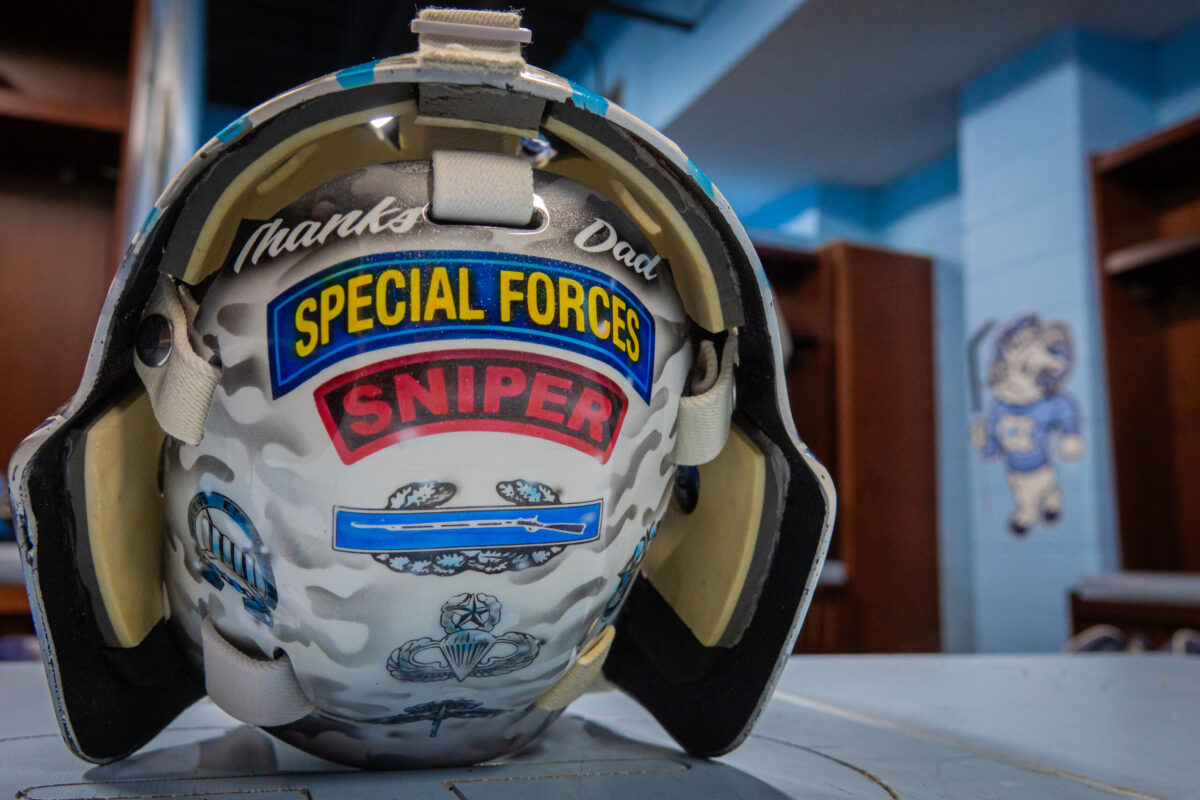
His goalie mask is a life collage. Airbrushed on the back are his Airborne Jumpmaster Wings, his Sniper sleeve tab and his Combat Infantryman Badge among others, and above them all is a simple message, Thanks Dad. (Photo: Carolina Alumni/Cory Dinkel)
Dimascio and Hughes attended Boston Bruins games together, and Hughes studied the technique of Hall of Fame goalies Patrick Roy and Martin Brodeur on television. Hughes admits he was not otherwise a particularly attentive student. “I hated school, and I had zero interest in going to college,” he said.
In September of his senior year at Coventry, Hughes’ homeroom teacher informed his class that an airplane had crashed into a building in New York City. A TV was brought in, and Hughes watched footage of a second plane crashing into the World Trade Center. “I’d been thinking about what to do with my life, and that day was a driving factor,” Hughes said. “I’d just been waiting for a purpose.”
Willing and able
On July 21, 1944, U.S. Army Pvt. Donald Lobaugh, who had enlisted as a response to the attack on Pearl Harbor, found himself in the jungle of New Guinea with the 32nd Infantry Division. Lobaugh’s platoon was pinned down by a Japanese machine gun when he took it upon himself to attack the gun location with a hand grenade. He was fatally wounded, but his actions allowed for the safe escape of the rest of his platoon. For his valor, Lobaugh was posthumously awarded the Medal of Honor.
As a child, Joel reveled in the military exploits of Lobaugh, his great-uncle, as well as both of his grandfathers, who also fought in World War II. Hughes fondly recalls playing with little green soldiers, building model warplanes and watching Turner Classic Movies’ military marathon each Memorial Day.
“I developed an interest in the military from seeing movies like Top Gun,” Hughes said. “Later on I started to understand the harsh reality of warfare, and I veered away from that. But when I was 17 and not wanting to go to school anymore, I circled back to the military.”
At the end of his senior year, Hughes enlisted in the Army without his parents’ consent. Then on March 20, 2003, only nine months after graduating from Coventry High, 18-year-old Joel Hughes was among the first and youngest troops to cross into enemy territory as the Iraq War began. “I still remember the first time I got shot at,” Hughes said. “I thought I was ready, but ignorance is bliss.”
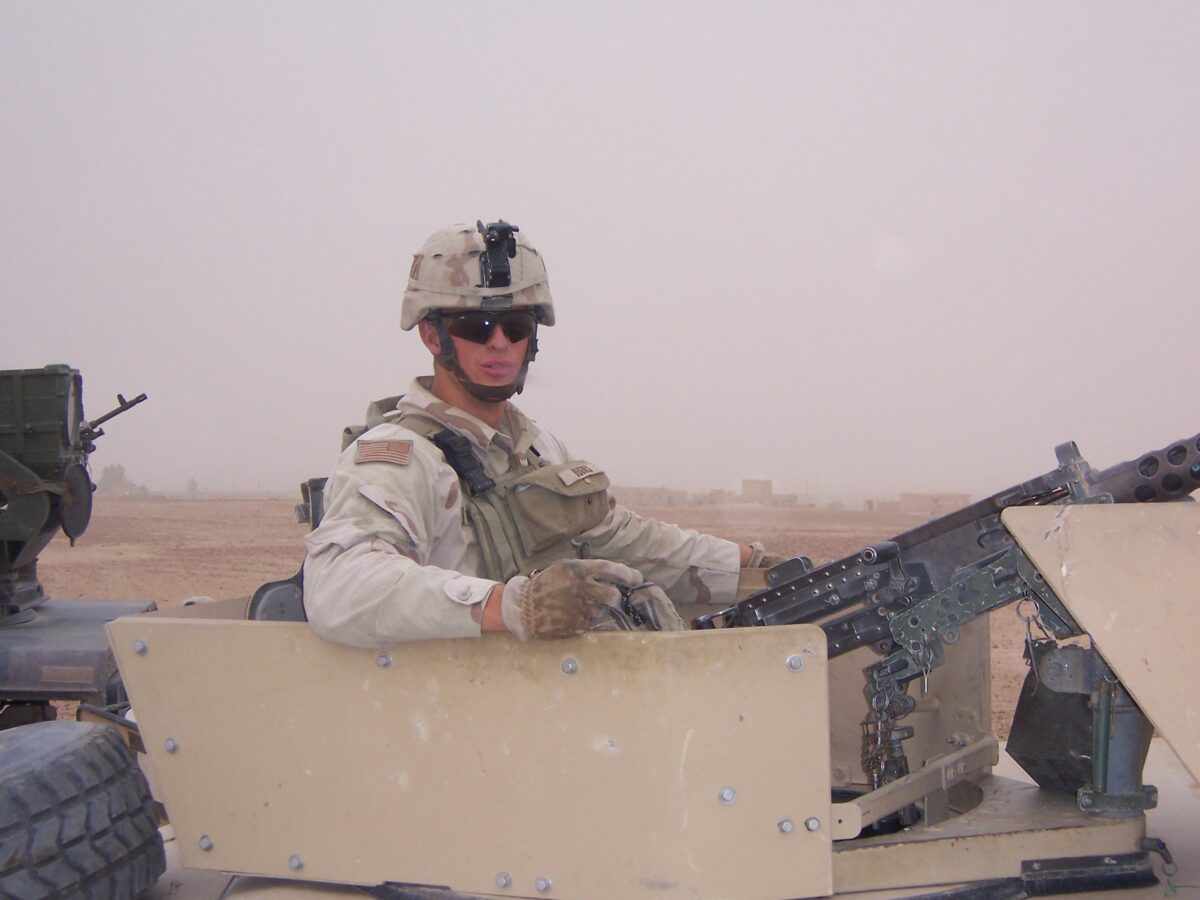
In 2003, 18-year-old Joel Hughes was among the first and youngest troops to cross into enemy territory as the Iraq War began. “I still remember the first time I got shot at,” he said. “I thought I was ready, but ignorance is bliss.” (Photo: Joel Hughes)
Hughes initially spent nine months in Iraq, returned to the United States to train as a sniper and then shuttled back for another one-year tour. “There were instances in the combat zone when we were taking fire, and I’d get these adrenaline shakes,” said Hughes’ sniper teammate Adam Bacon. “I would look over at Joel and ask, ‘Hey, are you feeling what I’m feeling?’ But he always looked just fine. He’s a calming presence, a leader who embodies the Army motto of Volens Et Potens, willing and able.” Hughes has the Latin phrase tattooed across his chest.
Through deployments to Iraq, the Philippines, Thailand, Malaysia and Afghanistan, Hughes became an elite U.S. Army Special Forces Green Beret. He spent nine months in Afghanistan during 2012 and 2013 performing more than 300 combat missions along the eastern border with Pakistan. “There were plenty of times when you hear a Taliban sniper’s gun go off and a bullet crack by your head, and you know you’re fortunate to be alive,” Hughes said. “I know a lot of guys who’ve been hurt or killed overseas, and it often comes down to you’re either lucky or you’re not.”
In January 2013, Hughes and his buddy James Grissom were returning to their base when a firefight broke out. “James was shot in the head,” Hughes said. “I was the first person to get to him. I took off my scarf and wrapped it around his wound. James died three days later, and dealing with that was the lowest point of my career.”
For that deployment, including his actions in trying to save Grissom’s life, Hughes earned a Bronze Star. Bacon believes Hughes’ fearlessness in battle stems partly from his upbringing. “There’s a quote about how the path of a true warrior is a lonely one, and that’s Joel,” Bacon said. “When I left my folks to go to war, that was awfully hard, but Joel charted his own way more. He didn’t worry as much about what anyone else would think. He just kept pulling the trigger.”
Back to the ice
While stationed at Fort Bragg (now Fort Liberty) in 2015, Hughes took his 5-year-old son, Jaxin, to dinner one evening at a local sports bar. Jaxin spotted a hockey game on television, turned to his dad and said, “I want to do that.” Hughes informed his son that he had played hockey growing up, and then, like his dad before him, Hughes found the money to buy his son a pair of skates. “I took Jaxin to a local ice rink, and he fell a few times and hated it,” Hughes said, laughing. “But I may never have thought about skating again if it wasn’t for him.”
It had been 13 years since Hughes had last been on the ice. “I honestly didn’t even know if I could remember how to skate,” he said, “but getting back to the rink inspired me to return to hockey.”
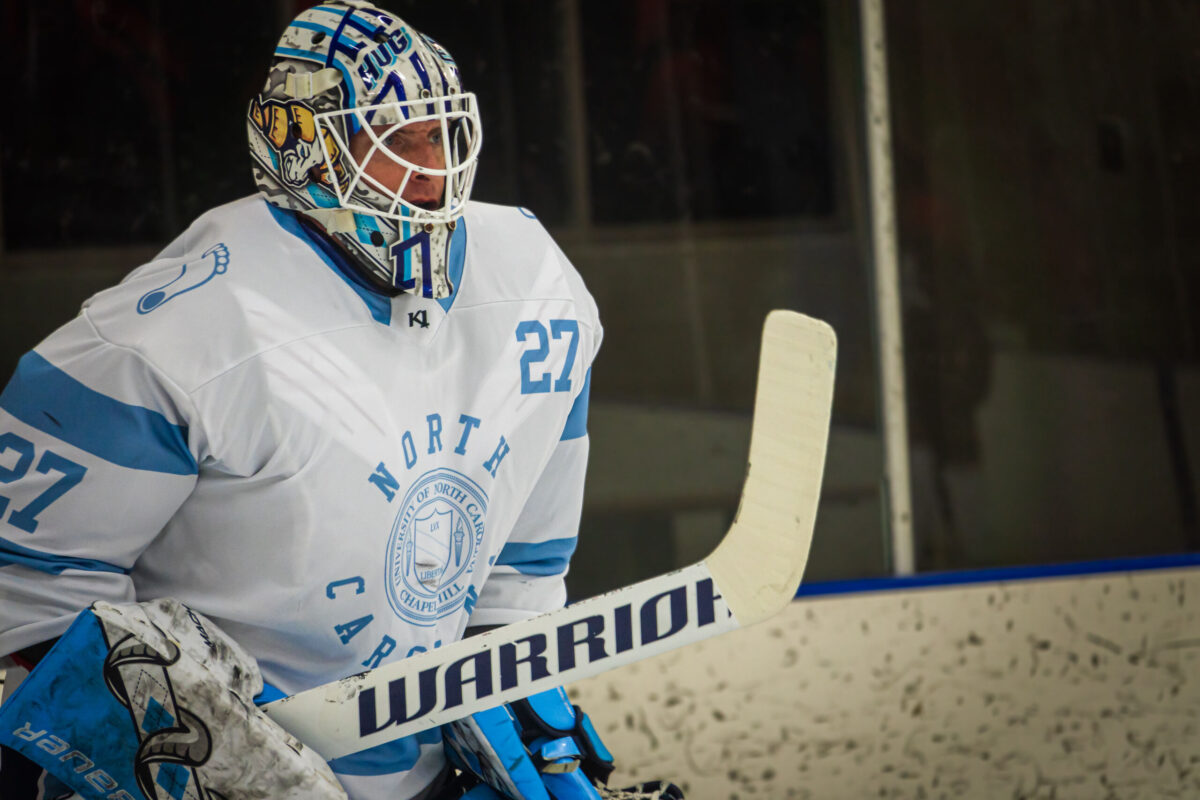
“There’s a quote about how the path of a true warrior is a lonely one, and that’s Joel.” (Photo: Carolina Alumni/Cory Dinkel)
Hughes rummaged through his belongings and turned up the goalie skates from his high school days, the only hockey equipment to survive his myriad moves. He joined the base’s team, Camp Patriot. “After the first few months, I thought, ‘How did I ever walk away from this?’ ” Hughes said. “I identify more with being a hockey player than I do a soldier. I couldn’t imagine not playing.”
In 2021, Hughes, still posted at Fort Bragg, was competing in an adult recreation hockey league in Raleigh with younger guys who had recently played in college. In the locker room after a game, Hughes mentioned that he was thinking about attending UNC when one of his teammates said, “You should play on the team.”
“What team?” Hughes asked.
“The hockey team.”
“No way. UNC has a hockey team?”
One of the boys
Jeff Volkman opened an email in fall 2021 and was surprised at what he read — a message from Joel Hughes inquiring about a tryout. Volkman, then the UNC hockey club coach, liked a lot of what he learned about Hughes. The guy had experience. The guy had size. The guy had motivation. But … the guy was 37 years old.
“Obviously, I don’t normally recruit guys in their late-30s, so I was very skeptical at first,” Volkman said. “But I was so impressed with Joel’s military background and his character that I didn’t care if he was 60 years old. Joel laid out his goals, and I knew that if anybody could achieve them, this guy could.”
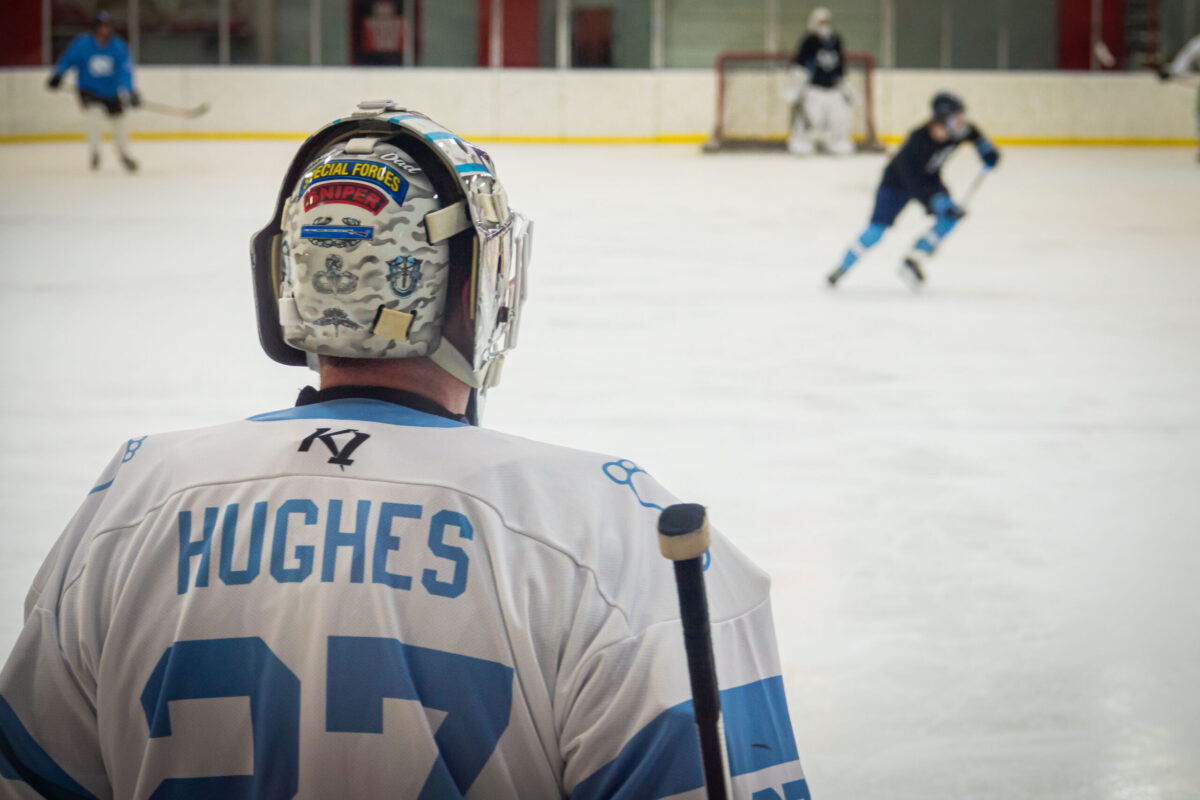
“Obviously, I don’t normally recruit guys in their late-30s, so I was very skeptical at first,” UNC hockey club coach Jeff Volkman said. “But I was so impressed with Joel’s military background and his character that I didn’t care if he was 60 years old.” (Photo: Carolina Alumni/Cory Dinkel)
Hughes wasn’t aware what good timing he had. Volkman was about to lose his two senior goalies after the 2021–22 season, and he was staring at a gaping hole in net. He invited Hughes to try out, and the coach couldn’t believe his luck.
“My current players were skating up to me asking, ‘Who is this guy?’ ” Volkman said. “That’s when I knew Joel could play at UNC. I remember telling him, ‘These guys thought they were going to light you up, but you shut them up. If you can get into school next year, the slot is yours.’ ”
“I walked into the locker room, and there’s this wardrobe of a man towering over me,” Carolina Hockey defenseman Florian Zajic said. “He’s 6 foot 4 inches, 280 pounds, a behemoth. I was so glad when I saw his goalie pads because that meant I would never have to take a hit from him.”
Defenseman Florian Zajic joined the Carolina team in August 2022. “When I enrolled at UNC, I was put into the hockey group chats, and there was this one guy who kept sending out these crazy workouts,” Zajic remembered. “He was saying that he’s expecting us all to run a mile in under 5 minutes and 30 seconds. I’ve never been able to do that! He was suggesting we lift weight I’d never dreamed of lifting. I assumed this guy was our strength and conditioning coach, but it turned out to be Joel.”
Zajic met Hughes a few weeks later. “I walked into the locker room, and there’s this wardrobe of a man towering over me,” he said. “He’s 6 foot 4 inches, 280 pounds, a behemoth. I was so glad when I saw his goalie pads because that meant I would never have to take a hit from him.”
Volkman admitted some initial concerns about the generation gap between Hughes and his younger teammates, but those worries were dispelled during a September 2022 road trip to Kentucky. During the early morning bus ride home, the Tar Heels bonded over “Rookie Idol,” an annual tradition that calls for every first-year player to go to the front of the bus and serenade the team with a song of his choice.
“All the rookies sang, and then somebody said, ‘Wait, isn’t Joel a rookie?’ ” Zajic recalled. “Well, nobody really wanted to wake up the Green Beret at 4:30 in the morning to tell him he has to sing for a busload of college kids. It was a bit precarious. What do we do? A, he is a rookie, but B, he could be our dad. So Joel got up and starts singing and, of course, it was some song none of us have ever heard of, probably from the previous century [“Buddy Holly” by Weezer, 1994]. But we were cheering him on, and he killed it. He’s one of the boys.”
At the outset of his rookie season, Hughes shared goalie duties with first-year student Lucas Brown, until a Sept. 30 game against rival N.C. State University, a team the Tar Heels hadn’t beaten in more than a dozen tries over seven years. Brown started the game, but after allowing two goals in the first period, he told Volkman that he didn’t feel well. “I walked over to Joel and said, ‘You’re in,’ ” Volkman recalled. “That’s tough to go in cold when we’re losing, but he shut down N.C. State the rest of the game, and we won, and from that point on I knew we would sink or swim with Joel.”
Hughes stopped 22 of 23 shots in his 40 minutes during that validating win over N.C. State — one of four UNC victories over the Icepack last season. “At the beginning of the season our opponents would be chirping, ‘Who’s that fossil you have in net?’ ” Zajic said. “And then soon they realized they were going up against a brick wall. By the end of the season, they would be whispering, ‘Is it true he was a Green Beret?’ Eventually rumors of his past spread all around the league that you might not want to mess with this goalie or it could be the last game you ever play.”
Hughes completed his first season with an 11–4 record, including a shutout of East Carolina. He helped guide UNC to its first-ever regional playoff victories and within one goal of reaching nationals for the first time, part of the best season in program history. Hughes finished second for Goalie of the Year in the league. After asking Volkman not to allow his teammates to vote for him for UNC’s season-ending awards because he preferred they enjoy the spotlight, Hughes was still voted co-Defensive Player of the Year, Iron Man and Most Determined.
“It meant a lot to me that my teammates thought that much of me because for a while I didn’t know if they saw me as one of them or as some sort of weird outsider,” Hughes said. “There were so many moments in my first season when I thought, ‘Wow, I can’t believe this is really happening!’ It is truly humbling.”
Bacon notes that on Hughes’ goalie mask, along with his Special Forces and Sniper tabs, he included his Infantry tab. “Joel has never forgotten his roots as an infantryman, a ground-pounder,” Bacon said. “A lot of people who accomplish as much as he has forget where they came from. He remembers who he was, and he’s starting to figure out the next step of who he’s going to be.”
Evolve and learn
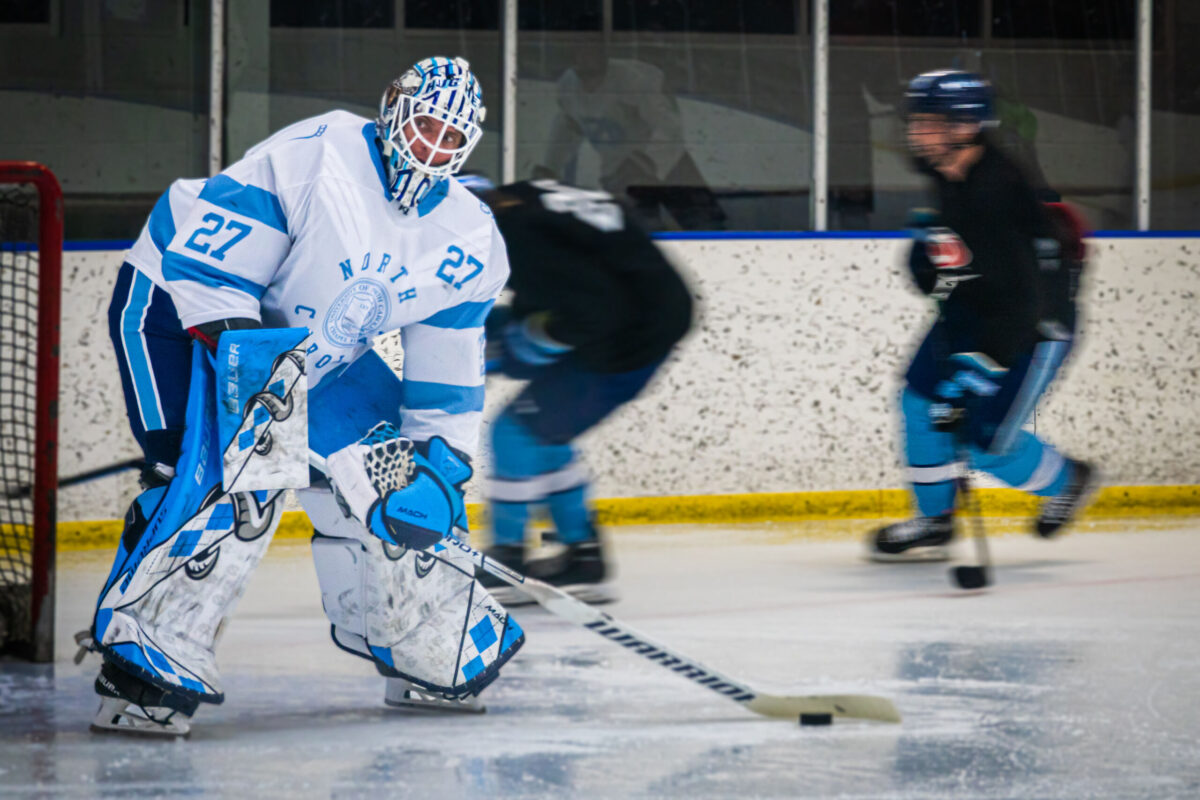
Hughes completed his first season with an 11–4 record, including a shutout of East Carolina. He helped guide UNC to its first-ever regional playoff victories and within one goal of reaching nationals for the first time, part of the best season in program history. Hughes finished second for Goalie of the Year in the league. (Photo: Carolina Alumni/Cory Dinkel)
During their first-ever meeting on Feb. 20, Joel Hughes and his biological father, John Rich, drove together to the biggest hockey game of Joel’s life. As a follow-up to the NHL Stadium Series at Carter-Finley Stadium, where the Carolina Hurricanes took on the Washington Capitals in front of 57,000 fans, Hughes was about to play a club game against NCSU in front of more fans than most NHL players ever have. While driving to the stadium, Hughes told Rich how his adoptive mother, Joni, had bought him a DNA test the previous August, and how through extensive research Hughes tracked down his biological mother in December and then Rich a month later. Rich told his son he proposed at age 18 to Joel’s 19-year-old mother and wanted to raise him, but his mother’s family insisted Rich sign adoption papers so Joel’s mother could continue her college education.
And then, somehow, Hughes played a hockey game, witnessed by his wife, Holly, Jaxin, Rich and Joni. (Hughes’ adoptive father, Clarence, died in 2015.)
During that winter holiday break, Hughes drove to western Pennsylvania over the Donald Lobaugh Bridge across the Allegheny River and into Freeport, Pennsylvania, to the town library. There he saw his great uncle’s Medal of Honor for the first time.
Then in August, during the first week of his second year at UNC, Hughes officially retired from the Army after 20 years. “[For] so many guys in the military, it defines them,” he said. “I didn’t want that to be me. I want to continue to evolve and learn.”
Hughes, 39, is working toward a degree in exercise and sport science. He said school is more difficult now due to traumatic brain injury he suffered while in the Army. “My memorization is not anywhere near where it used to be,” he said. “My short-term memory is particularly bad, which probably helps me as a goalie because I don’t dwell on the goal I just let in.”
Hughes’ dream career is to be a strength and conditioning coach for an NHL team as well as a goalie coach, mentoring kids the way Dimascio once did him. Back in Warwick, Rhode Island, Dimascio and his son, Kyle — another goalie — stream every UNC hockey game they can. “Whenever we watch Joel’s games, I actually forget how old he is,” Dimascio said. “He looks like he belongs there, and I’m really proud of how he’s become a role model and a hero to my son.”
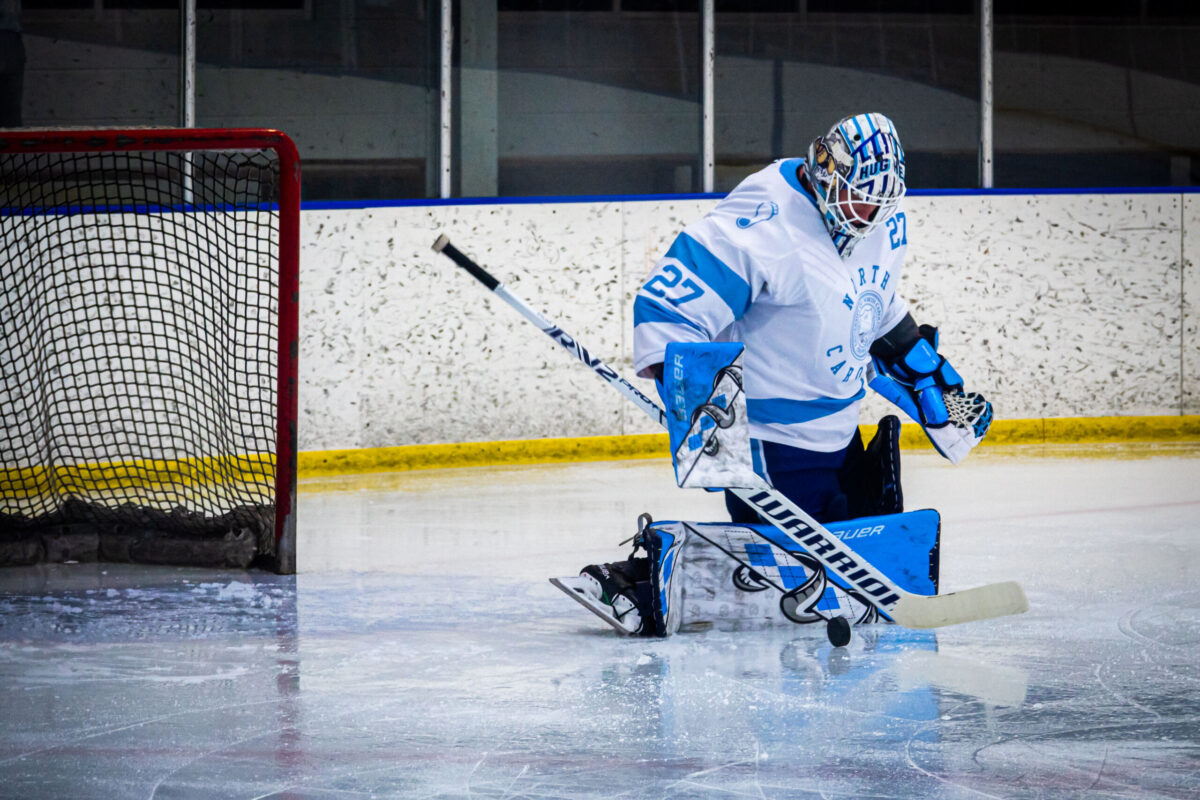
“At the beginning of the season our opponents would be chirping, ‘Who’s that fossil you have in net?’ ” Zajic said. “And then soon they realized they were going up against a brick wall. By the end of the season, they would be whispering, ‘Is it true he was a Green Beret?’ “ (Photo: Carolina Alumni/Cory Dinkel)
Hughes is willing and able to pay it forward. It isn’t lost on him that he plays alongside young men the same age he was when he first set foot on enemy soil in Iraq. “His presence in the locker room is really powerful because his military background puts things in perspective,” Volkman said. ‘Whenever Joel talks, there’s a tremendous amount of respect for him in that room.”
When UNC hockey was in Washington, D.C., for a tournament in November, Hughes invited his teammates to join him for a visit to Arlington National Cemetery. Hughes led them to the gravesites of James Grissom and Matthew McClintock, another close friend who served with Hughes in Afghanistan and died trying to rescue a wounded colleague on the battlefield. “It sends shivers down my spine thinking back to that day,” Zajic said. “Joel educated us on war and death and life. He wanted us to appreciate that teammates are like family. Joel’s an intimidating human being, but to us he’s the kindest soul you’ll ever meet.”
“Joel always told me that growing up he wished he’d had brothers,” Bacon said, “and I believe he’s found those brothers in the Army and now playing at UNC.”
Hughes still has three years of athletic eligibility, but because of the time commitment and travel required with UNC hockey, he promised his wife that this season will be his last. He hopes this hockey journey will end with UNC competing at nationals.
“I’m having the time of my life,” Hughes said. “Every moment that I’m playing hockey I’m beyond happy. I want to be involved with the sport forever because for me the ice has always felt like home.”
Tim Crothers ’86, a former senior writer at Sports Illustrated and a lecturer at the Hussman School of Journalism and Media, first wrote about UNC hockey as a staff writer at The Daily Tar Heel.
Thanks for reading the Carolina Alumni Review
Carolina Alumni members, sign in to continue reading.
Not yet a member? Become one today.
